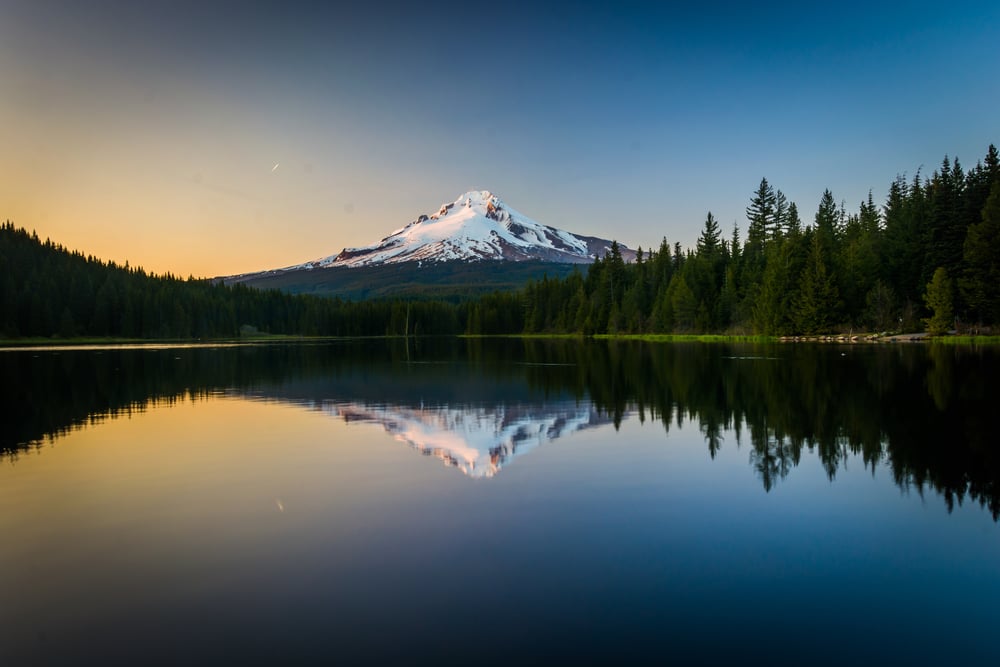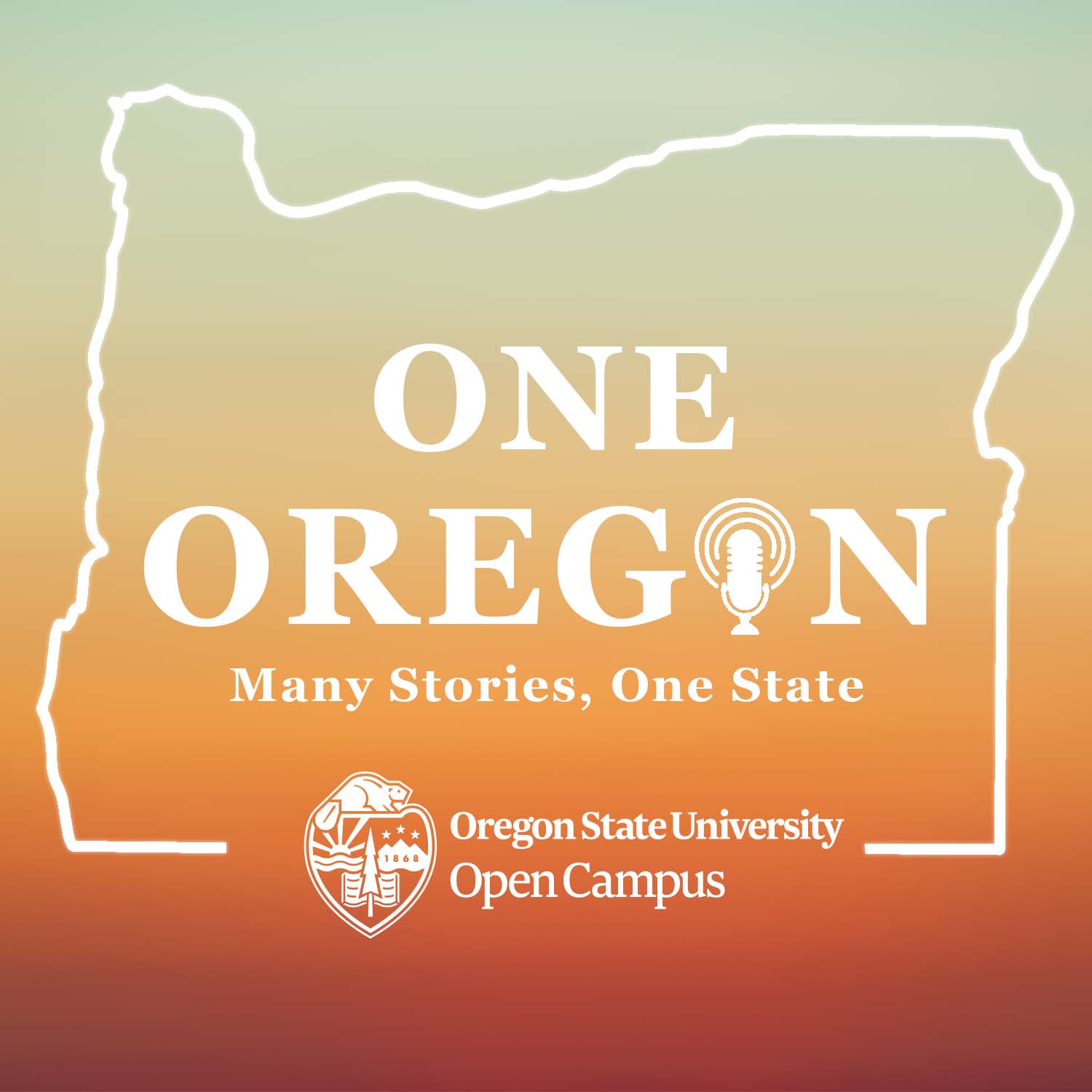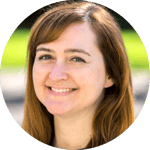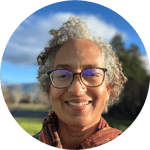Episode 03 Transcript:
Hi Everyone, I’m Emily Henry and I’m Ann Harris welcome to One Oregon… a podcast featuring stories from real people from across our state sharing about their experiences and lives.
We hope that hearing their stories will help to break down barriers and smash pre-conceptions that we may have in our minds about what it means to be an Oregonian. It is our intention this podcast will have a positive ripple effect that will help to bring us all together as One Oregon.
Today we are joined by Monserrat Alegria. Monserrat is part of our Oregon State Open Campus and Juntos team, serving as the Juntos Coordinator in Southern Oregon supporting Latinx students and families through the college-going process. She also shares her position with Southern Oregon University, where she coordinates Latinx programming. Monserrat joined us from her office in Ashland for this interview.
And we will start today where we also do – with hearing where did Monserrat’s Oregon story begin…
Monse: I would say that my oregon story begins with my dad and my family's migration story he moved to the u.s when he was 18. he lived with multiple family members he has a lot of cousins aunts and uncles here in the u. i was born in california a lot of the cousins my age were also born in the same town or area and it's really usual or common for immigrant communities to follow each other we often say or joke that it's because of word of mouth you know someone moves to a new place they talk to the rest of the family members or friends and say there's a lot of jobs here it's a pretty place come visit or follow me i'm not sure who ended up in oregon first but i guess little by little everyone started following and of course everyone fell in love with the landscape just how beautiful and green oregon is
instead of moving to oregon we moved back to mexico because my mom wanted to be close to her family she wanted to continue working on her career so we did live in mexico for 11 years but my dad ended up wanting to move back to the u.s and he went to oregon and he fell in love with the place he always tells me i wish i would have visited soon because of just how beautiful and breathtaking it is and i agree i do see myself living here having a family just spending the rest of my life here instead of moving back home which is mexico
Ann: so can you tell us a little bit about your experience of those 11 years in mexico and your school experience in particular just curious about how that might be similar or different than what folks here in oregon have experienced
Monse: i moved to guadalajara jalisco mexico and i got to go to preschool elementary school middle school and i actually moved to the u.s after finishing my freshman year in high school
i really liked the school there and even though i only finished my freshman year in high school at that point i knew what i wanted to do post high school i knew i wanted to go to college i know i wanted to become a journalist and i was familiar with the steps i was familiar with the application process i knew what school i wanted to go to even though it was relatively soon in the process i still had three or four more years to go before actually applying but it didn't seem like anything intimidating when i moved to the us of course that was completely different i had to learn a new educational system at the same time i was also learning a new language so it was intimidating not knowing how to navigate this new system learning a new language adapting to a new culture and also trying to find a support system that could help me navigate that because in mexico a lot of my family members did go to college my mom has a master's degree in education so that's why i have always had the motivation and that's why i was familiar with those systems and i knew the steps that i needed to take but moving to the us that was completely different even though my parents have always been really supportive of course they couldn't help me now because they themselves were also trying to adapt to this new country and navigating the same systems
so i would say in that sense schooling was really different in both countries i i would say also that my aspirations and goals didn't change now i just had additional challenges that i was not facing in mexico because of course i was not part of a minority i was not a first generation student like i felt i was here even though my mom went to college in mexico or her knowledge and support she couldn't really help me here and i think of the work that i do now i can relate with the students that we're helping a lot of them are first generation students and they need that additional support when it comes to navigating higher education systems steps applying to college or just even having a better understanding of what they want to do post high school so in that sense i think i can really relate to the struggles of the students that we support and our work but ultimately i was grateful to find a community that really helped me i had a lot of support from academic advisors in high school even the the ell specialist she walked me through all the steps she helped me in every step needed and i'm so grateful for that support
Monserrat moved from a large city in Mexico to a relatively rural part of Oregon as a teenager. Beyond the differences in the school system that Monserrat shared, she faced other challenges while adjusting to this move.
Monse: adjusting to moving to oregon was definitely challenging at that time i was 16 coming from guadalajara which is the second largest city in mexico moving to oregon and specifically medford it was such a drastic change i felt there there were a lot of things in that i could no longer do i'm someone that loves live music going to concerts dancing and it felt that that wasn't really available here specifically so that transition was definitely challenging i even that even took a toll on my mental health i became depressed i was struggling in academics i had to see a therapist of course you know like the typical experience of navigating a new system moving to a new country and even self-esteem issues you know thinking that you're no longer as smart as you thought you were because now you're navigating school in a new language and you can't be as engaged in class as your classmates because you're embarrassed of your accent or you don't know how to communicate effectively so of course it was super challenging but now that i reflect back i'm also really grateful to be here yeah it was definitely a drastic change and the sense of medford is rural compared to guadalajara but also medford or jackson county is not as rural as our neighboring towns or counties so in a sense now that i'm older i feel really comfortable in a space like this i think i really appreciate not having that sense of a rush that you get living in a city i really enjoy you know like not having traffic on my daily commute or i always joke and say that it takes about 10 minutes to get anywhere across town but i really enjoy it now and it's hard for me to picture myself living in a big city or even going back to mexico and live there again people have asked me actually if i would ever consider moving back and at this point i think i will consider it for family reasons be a caregiver for my grandparents or something that might feel like a major reason but now i really love oregon and living here and medford
Ann: we are hoping that you can tell us a little bit about how you got involved in the community storytelling project and why storytelling is important to you
Monse: as i'm getting older i have felt the need to connect back to my roots and my family and like i said before a lot of my family lives still in mexico i do make an effort to go and visit whenever i'm able to but every time i go i usually visit for two weeks one month at a time and it doesn't feel like enough time to visit all my family members to have quality time bond and even learn my family's history every time i go up they said you know there's new babies that are being born there's also people that have passed and i don't know if it's part of life and getting older that you are craving the sense of knowing or deep connection to your family especially with a distance that it makes it so challenging i talk to family members on the phone all the time and that still doesn't feel like the best way to build those or strengthen those relationships so now that i've been more involved in storytelling projects i think i'm using that as a motivation to also get to know my family history more every time i go to mexico i ask my grandparents questions about our family their childhood their experiences going into school their grandparents you know family members that i've never met before but that to me is really important because like i said i'm so distant from family like physically distant that i think that keeping those stories alive is like one of the motivations for me to continue on my daily basis
it can be really isolating to feel that you're here in new country trying to do your best you know trying to thrive be successful but also knowing that something that is really deep to your heart that your family is somewhere else and that you're missing milestones you know you're missing seeing your nieces and nephews grow nieces and nephews being born your cousins getting married so i think that that this connection with my own family was a motivation to me to be involved in storytelling or in particular with the hearth
i learned about the hearth which is a non-profit organization in ashland oregon they do a lot of work around storytelling they have host community events where you know there's always a theme and people share stories with that theme and the reasons might be different but ultimately once again storytelling is the root of it
i got involved with the hearth and their storytelling certificate program because i had friends that went through the certificate program there's one of my mentors here in the community she's a professor at southern oregon university and she let us know that this was a great opportunity she was familiar with the work that the hearth was doing and she wanted more folks of color to be involved she wanted more latinx folks to go through this certificate program and start doing more intentional storytelling events in our community because even though storytelling has always been part of our cultural traditions for people of color for indigenous folks for latinx folks it doesn't mean that we might have the spaces or activities or events where we have those opportunities to share our stories so our mentor alma rosa she talked to my friends my friends went through the certificate program and for the second round they had to nominate someone and they nominated me so i went through it's a few months it's an intensive certificate program you learn all about how to craft a story the importance of storytelling sharing our stories
when the fire happened in jackson county the albedo fire of september of 2020 the hearth decided to take action and they wanted to provide a space where folks could find community grief together listen to one another just ultimately be there to support in whatever way possible
some folks were going to the expo which is the place where all the community agencies gather for survivors of the fire to go and seek support resources so some of us will be there helping translate helping fill out forms um the people were requesting aid and other folks were just there to listen whoever felt that they wanted to share their story whoever wanted to bend who whoever needed help we could just be there to provide that support and not just for the people that were directly impacted but also for the volunteers at some point i felt that people didn't want to talk because they were just trying to survive of course they were just focusing on finding housing focusing on on gathering clothes and food for the next day i think that focusing on their mental health was the least of their concerns even though we were trying to provide that support maybe that's not what was needed at the point so we also wanted to talk to the volunteers the people that were making an effort to be there because we know that it can be emotionally exhausting for these people and even if you haven't been directly impacted just being part of this community just seeing the impact that i had and hearing the stories of these folks that were impacted could also take a toll on your mental health so those are the first steps that we took we were just showing up at the expo and other community spaces where people were gathering and just be there people wanted to talk we also were collecting stories via paper if people didn't necessarily want to talk but they still wanted to write it down and ultimately i think we wanted to gather those stories for the future you know we wanted to remember this in the future and realize that despite of the pain that our community just went through that we were able to come together and we hope to look back and just remember and honor those stories and that way
Ann: We know that the Latino community was particularly hard hit by this fire...can you talk about how you used storytelling to support this community?
Monse: the towns of phoenix and talent were the most impacted by the fire and although i don't have demographic information they were majority latino population so that meant that all the fire relief efforts require a culturally responsive approach information and spanish or other languages that folks needed and overall just more presence of latinx and other people of color in leadership roles so that our community members could feel safe and comfortable reaching out
so because of that need we started considering doing spanish story circles we felt once again the maybe talking so much about the fire was too recent or not what people thought they needed the most but we still wanted to host those spaces so we come up with different themes one of the times we hosted a spanish story circle with the theme of the pandemic you know something that may not feel as such a heavy topic but it was definitely a heavy topic because we talked about the sense of community feeling isolated even grieving you know a lot of us lost family members because of covid my grandpa passed away in mexico because of covid so even having the opportunity in that space to talk about other things that may not be related to the fire but there were still issues that were impacting our daily basis i think it was such needed work
so we hosted multiple spanish story circles about the pandemic we also talked about traveling you know we also try to talk about fun topics of course not everything is about lost and grieving and emotionally heavy conversations we always try to find the beauty in our life experiences as well the most recent one was on day of the death and something that i really appreciate about this spaces is uh i think we can all find common commonality between our stories we often provide flexibility in our prompts so for example for the day of the dead we have said that if you did not want to talk about a loved one that passed away you can interpret loss in whatever way makes sense for you it might be the loss of a friendship or the loss of a romantic relationship that didn't work out you know whatever way people reflected or connected to these themes or topics they could talk about that and i think that really allowed for connection because it might be easy to say well this is not the space for me because i don't have anything to talk about death i don't have a member that has passed away recently or i don't have anything to talk about because i was not directly impacted by the fire so therefore this is not a space for me and i would like to say that on the contrary it is the best place to be because we come to realize that stories can really help us unite and be connected when we have hosts the the story circles is often people that you have never interacted with before and because they were being hosted virtually i think that really allowed people from all over the state people from other parts like here in medford a really diverse group when it comes to age group race ethnicity and it was such a beautiful experience to see everyone gather and being willing to be vulnerable and open and just share our stories with one another and i think the most gratifying part of it is that afterwards people will feel connected you know even if you have never met this person before do you just share three or four minutes of something so vulnerable to you that you feel that this person is now someone that will remember your story even if you may never come across them again when we host this activities or story circles we ask people to be respectful and we ask them to honor each other's stories so i think that and i do hope that people leave those spaces feeling that way that these people are part of our communities they are our neighbors even if we hadn't met them before and that they will continue honoring our stories every day
Emily: And we end the way that we always do by asking Monserrat, what is something you like about your community and you can define community any way you would like…
Monse: even though it was hard to adjust to living in medford or oregon overall 14 years ago i would say that now i feel really happy and content where i am i love this place i love this communityand i think that it is important to address that at least in oregon you know rural communities can be places where folks of color may not feel safe or welcomed we see racism on a daily basis and i think it's important to acknowledge that living in a rural community brings that sense of hostility or just having to be careful of your actions where you navigate life who's part of your circle but i also have to say that something i found that is true in this community is that we have been able to come together in moments of need crisis or difficulty i think that was a clear example when the fire happened people from all walks of life you know people from all races ethnicities religions came together because this community really needed help i can also relate to that and the sense that when i have needed support i found in people that haven’t even met me before or that don't even know my family i remember when i was in college and i was getting ready to study abroad i needed to fundraise and multiple people from church came together to do a tamale fundraiser at that time i didn't know how to make tamales but multiple people gathered at my house we were able to cook about 500 sell them and that was enough for me to buy my flight to spain and i still remember that even though that was about 12 years ago and i think that's a clear example of people coming together when someone needs it you know and that in that scenario maybe wasn't a moment of pain in that sense it was something that i was looking forward to it was something fun i wanted to experience but once again i think people are willing to be there for their neighbors even people that you haven't met before but you know that they need any type of support and that's something that i think is so unique
the sense of unity and moments of difficulty is something that i really love about being part of this community and i hope that i can also do the same for others when they need it the most
Thank you to Monserrat for taking the time to chat with us and share more about the power of storytelling and her own personal story. To learn more about The Hearth visit thehearthcommunity.com and to learn more about Monserrat’s work, visit our site opencampus.oregonstate.edu
You’ve been listening to One Oregon: Many Stories, One State. I’m Ann Harris and I’m Emily Henry.
We want to thank Tim Mayer, jazz piano player and jazz activist, for offering his time and talent to creating a uniquely Oregon musical environment for our podcast
Also, a huge thank you to Rick Henry, editor extraordinaire, for his patience and persistence in guiding us through this first season - we could not have done it without you.
Thanks to you for listening! Please tell your friends about us. We hope you’ll join us again for another episode of One Oregon







